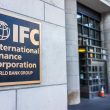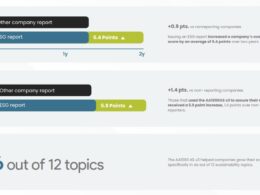As a media partner for the Asia Sustainability Reporting Awards (ASRA) 2024, ESG Post had the opportunity to interview Mr. Lloyd Chen, Chief Financial Officer of E Ink Holdings Inc. The company was recognised for its excellence in sustainability reporting, securing Asia’s Best Sustainability Report (Governance) bronze medal, Asia’s Best Materiality Reporting bronze medal, and Asia’s Best Supply Chain Reporting silver medal.
In this conversation, Mr. Chen shares insights into E Ink’s sustainability reporting journey, the challenges of reporting, and the value it brings to the company and its stakeholders.
Why does your company publish a sustainability report?
E Ink integrates sustainability into its core strategy, positioning ePaper (electronic Paper) display as a Green Product and expanding its impact through ESG principles under our PESG framework. Our sustainability report serves as a transparent and structured platform to communicate our commitment, initiatives, and progress across key areas, including product sustainability, green production, enterprise care, corporate governance, sustainable supply chain, and social engagement.
By openly sharing our journey, we provide investors, suppliers, customers, and the public with a clear understanding of how we integrate sustainability into every aspect of our business. Our report also aligns with global sustainability frameworks and standards, such as GRI, SASB, TCFD, and TNFD, ensuring that our disclosures are comprehensive, credible, and aligned with international best practices.
Which part of sustainability reporting did you find to be the most challenging?
Managing sustainability reporting across multiple countries and operational sites, primarily in Taiwan, China, and the United States, poses challenges in ensuring data completeness, consistency, and accuracy. To address this, we have implemented standardised methodologies and systems to streamline data collection and enhance reporting precision.
Another key challenge is adapting to evolving international reporting standards. As standards such as IFRS S1 and S2 introduce new disclosure requirements, we must stay informed, assess implications, and adjust our reporting approach and even operational processes accordingly. This requires continuous monitoring of global trends, a deep understanding of regulatory developments, and proactive internal preparation to ensure compliance and alignment with sector norms and regulatory expectations.
By adopting a forward-thinking approach and continuously refining our processes, we strive to meet these challenges while maintaining transparency, reliability, and international credibility in our disclosures.
How has your company benefitted from disclosing sustainability performance?
Sustainability reporting strengthens E Ink’s brand reputation, stakeholder trust, and industry leadership by transparently showcasing our commitment to sustainability. For example, our report highlights that 99.9% of our revenue is recognised as Green Revenue under FTSE Russell’s Green Revenue Model, and it outlines our ambitious net-zero targets, along with key milestones where we have exceeded expectations.
By openly disclosing our progress, we not only reinforce our dedication to sustainability and continuous improvement, but also enhance stakeholder confidence by helping investors, customers, and partners better understand our impact and long-term vision. This transparency strengthens our competitive position and influence in the sustainable technology sector.
Beyond external recognition, disclosing sustainability performance serves as a powerful internal tool. A structured and data-driven approach allows our teams to assess progress, acknowledge achievements, and identify areas for further enhancement. It fosters a culture of accountability, motivation, and shared purpose, propelling us toward even greater sustainability milestones.
What steps do you take to ensure that your sustainability report is reliable and credible?
We ensure the accuracy and integrity of our sustainability report through a structured and multi-layered validation process. Our report adheres to globally recognised sustainability frameworks and standards, including GRI, SASB, TCFD, and TNFD, ensuring consistency with international standards.
To enhance transparency and data accuracy, we incorporate sustainability reporting into our internal audit processes. Additionally, our report undergoes independent third-party assurance following standards such as AA1000, reinforcing the credibility of our disclosures.
Before publication, the report is reviewed and approved by our Management Executives and Board of Directors, further strengthening governance, accountability, and trust. This rigorous verification process ensures that our sustainability disclosures are comprehensive, reliable, and aligned with industry standards and global benchmarks.
How do you think sustainability reporting will evolve in the next five years?
Sustainability reporting is expected to become more standardised, structured, and data-driven, enhancing clarity, consistency, and comparability across industries. This evolution will help minimise reporting gaps and ambiguities while improving the quality and relevance of disclosures.
The scope of reporting will also broaden to include enhanced financial disclosures on climate-related and nature-related risks, as well as more comprehensive reporting on human rights, social responsibility, and supply chain sustainability, among others. As stakeholder expectations rise, companies will need to provide deeper insights into their ESG impact and performance.
Additionally, the shift toward digitalisation and real-time reporting will drive companies to invest in ESG data management platforms. Businesses may be required to integrate reporting systems with global digital platforms, ensuring more efficient, transparent, and interactive sustainability disclosures. This transformation will not only improve data accuracy but also enhance stakeholder engagement through dynamic and accessible reporting formats.
What advice would you offer to other companies striving to enhance their sustainability reporting practices and earn recognition in initiatives like the Asia Sustainability Reporting Awards?
Participating in sustainability reporting awards, such as the Asia Sustainability Reporting Awards, or global assessments like the S&P Global Corporate Sustainability Assessment can elevate a company’s visibility, credibility, and benchmarking opportunities. Engaging in these initiatives provides valuable insights into industry best practices, encouraging companies to refine their reporting and enhance transparency.
However, beyond external recognition, companies should develop a sustainability report that is authentic, purpose-driven, and aligned with their long-term commitments. A strong report should not only disclose key initiatives and performance metrics but also serve as a tool for continuous improvement and strategic alignment.
Following internationally recognised frameworks and standards, such as GRI, TCFD, ISO 14064-1 (greenhouse gases), ISO 50001 (energy management), and others, ensures comprehensive, credible, and globally consistent disclosures. Additionally, third-party assurance can strengthen report reliability while offering external insights for further enhancement.
Ultimately, a well-structured, transparent, and forward-looking sustainability report is more than a means to gain recognition, it is a powerful instrument for demonstrating accountability, driving impact, and fostering trust with stakeholders.





















